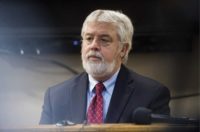Lawsuits
Engineers Blame Public Officials in Flint, Mich., Water Trial Opening

Lockwood, Andrews & Newnam Inc. and Veolia North America had both worked on water-related issues for the city of Flint, Mich.
Photo by Sean Marshall/Flickr
Opening statements began Feb. 28 in the Flint, Mich., water crisis civil trial to determine if engineering consultants Veolia North America and Lockwood Andrews Newnam Inc. bear any responsibility for the lead contamination of the city's drinking water in 2014.
The families of four children are suing the engineering companies for alleged negligence for injuries they say were caused from their exposure to lead in Flint’s drinking water in 2014 and 2015. The companies were not part of a $626.5-million settlement reached between the state of Michigan and victims and approved last year.
A jury of seven women and three men was seated last week in federal court in Ann Arbor, Mich., with Judge Judith Levy presiding.
'The Flint water crisis was a failure of government at the highest levels.'
—Daniel Stein, attorney for Veolia North America
Attorney Corey Stern, representing the families that filed the lawsuit, used his opening statement to create a timeline of what he called "unreasonable behavior" by the firms, which he accused of bypassing critical testing before the water source switch and treatment.
“LAN could have stood up and said, 'No water testing, no report, no dice, not gonna do it,' Stern claimed. Instead, he said that LAN and the city made a contract change order but didn't include the needed precautions.
"Once again in the change order, not a single mention of no corrosion control, no testing report, we cannot do this, certainly cannot do this safely without an engineering report," he said.
"You will decide if LAN met its duty of care," Stern told the jurors.
He also claimed the companies put their own business interests ahead of what was best for the citizens of Flint.
"We want companies to treat the members of society reasonable. Just like when you undertake to get in a vehicle and drive, the law requires that they act reasonably. Remember the health, safety and welfare of the general public should be an engineer's first priority," Stern said.
LAN and Veolia attorneys, offered jurors a vastly different picture. The city of Flint, which had been in a financial crisis, was being run by emergency managers appointed by former Michigan Gov. Rick Snyder.
The firms' attorneys argued that key information was withheld from their staffs by Flint emergency managers, employees at Flint's water plant, the Michigan Dept. of Environmental Quality and even the state itself.
Flint had declared municipal bankruptcy in 2013 and a series of emergency managers operated as the final decision-makers on matters involving Flint's decision to switch its water source from Lake Huron via the Detroit Water and Sewage Dept. to the Flint River in 2014 that precipitated the crisis.
"The Flint water crisis was a failure of government, from the highest levels," said Veolia attorney Daniel Stein. "Even as the people of Flint begged for help, officials dug in their heels, lied to the people and withheld information" from the firm. "The power to act, the power to do something was with the politicians who hired [the company]. Tragically, for the people of Flint, those officials never listened" to Veolia.
Engineers: We Were Shut Out
Attorney Wayne Mason, representing LAN, followed with a similar statement.
He told the jurors that the firm's chief engineer, Warren Green, was essentially locked out of decision-making about Flint's switching of water sources temporarily to the Flint River. Despite several requests to be more involved in actions taken by the city to act on LAN's recommendations, Green was kept away from both Flint and the treatment plant.
"Ninety-nine percent of the time Warren Green wasn’t anywhere near Flint because the city did not want him there." Mason said. "He pushed for a seat at the table and was repeatedly shut out. They wanted him to stay on airplanes or in his office in Chicago. They didn’t want Warren to see the path they were heading down. There were agenda-driven decisions going on in the backrooms of government starting in 2012."
The first witnesses will follow in what is scheduled to be a four-month trial.





